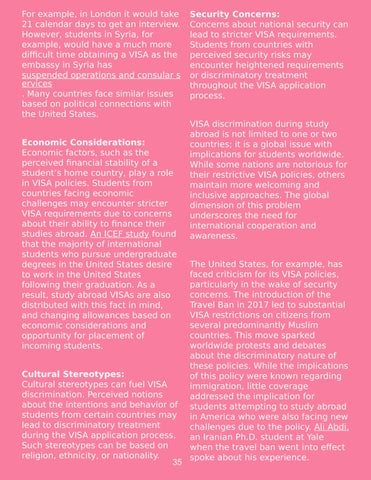For example, in London it would take 21 calendar days to get an interview. However, students in Syria, for example, would have a much more difficult time obtaining a VISA as the embassy in Syria has suspended operations and consular s ervices . Many countries face similar issues based on political connections with the United States. Economic Considerations: Economic factors, such as the perceived financial stability of a student’s home country, play a role in VISA policies. Students from countries facing economic challenges may encounter stricter VISA requirements due to concerns about their ability to finance their studies abroad. An ICEF study found that the majority of international students who pursue undergraduate degrees in the United States desire to work in the United States following their graduation. As a result, study abroad VISAs are also distributed with this fact in mind, and changing allowances based on economic considerations and opportunity for placement of incoming students. Cultural Stereotypes: Cultural stereotypes can fuel VISA discrimination. Perceived notions about the intentions and behavior of students from certain countries may lead to discriminatory treatment during the VISA application process. Such stereotypes can be based on religion, ethnicity, or nationality. 35
Security Concerns: Concerns about national security can lead to stricter VISA requirements. Students from countries with perceived security risks may encounter heightened requirements or discriminatory treatment throughout the VISA application process. VISA discrimination during study abroad is not limited to one or two countries; it is a global issue with implications for students worldwide. While some nations are notorious for their restrictive VISA policies, others maintain more welcoming and inclusive approaches. The global dimension of this problem underscores the need for international cooperation and awareness. The United States, for example, has faced criticism for its VISA policies, particularly in the wake of security concerns. The introduction of the Travel Ban in 2017 led to substantial VISA restrictions on citizens from several predominantly Muslim countries. This move sparked worldwide protests and debates about the discriminatory nature of these policies. While the implications of this policy were known regarding immigration, little coverage addressed the implication for students attempting to study abroad in America who were also facing new challenges due to the policy. Ali Abdi, an Iranian Ph.D. student at Yale when the travel ban went into effect spoke about his experience.












